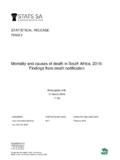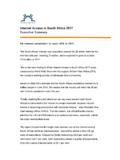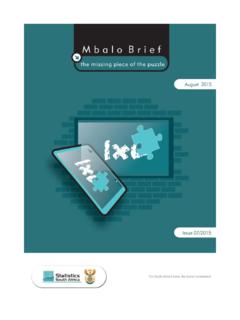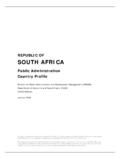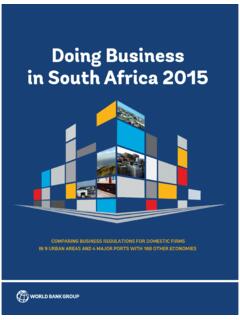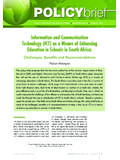Transcription of Tobacco Excise Taxation in South Africa - who.int
1 10 World Health Organization World Health OrganizationCorn van WalbeekUniversity of Cape Town, South AfricaTobacco Excise Taxation in South Africa2 World Health Organization Tobacco Free Initiative Headquarters would like to thank the Regional Offices for their contribution to this Regional Office for Africa (AFRO)Cite du DjoueBo te postale 6 Brazzaville Congo Telephone: +(1-321) 95 39 100/+242 839100 WHO Regional Office for the Americas / Pan American Health Organization (AMRO/PAHO) 525, 23rd Street, , DC : +1 (202) 974-3000 WHO Regional Office for the Eastern Mediterranean (EMRO) WHO Post OfficeAbdul Razzak Al Sanhouri Street, (opposite Children s Library)Nasr City, Cairo 11371 EgyptTelephone: +202 670 2535 WHO Regional Office for Europe (EURO) 8, ScherfigsvejDK-2100 CopenhagenDenmarkTelephone.
2 +(45) 39 17 17 17 WHO Regional Office for South -East Asia (SEARO) World Health House, Indraprastha EstateMahatma Gandhi RoadNew Delhi 110002 IndiaTelephone: +(91) 11 337 0804 or 11 337 8805 WHO Regional Office for the Western Pacific (WPRO) Box 29321000 ManilaPhilippinesTelephone: (00632) 3 Tobacco Excise Taxation in South Africa2 World Health Organization Tobacco Free Initiative Headquarters would like to thank the Regional Offices for their contribution to this Regional Office for Africa (AFRO)Cite du DjoueBo te postale 6 Brazzaville Congo Telephone: +(1-321) 95 39 100/+242 839100 WHO Regional Office for the Americas / Pan American Health Organization (AMRO/PAHO) 525, 23rd Street, , DC.
3 +1 (202) 974-3000 WHO Regional Office for the Eastern Mediterranean (EMRO) WHO Post OfficeAbdul Razzak Al Sanhouri Street, (opposite Children s Library)Nasr City, Cairo 11371 EgyptTelephone: +202 670 2535 WHO Regional Office for Europe (EURO) 8, ScherfigsvejDK-2100 CopenhagenDenmarkTelephone: +(45) 39 17 17 17 WHO Regional Office for South -East Asia (SEARO) World Health House, Indraprastha EstateMahatma Gandhi RoadNew Delhi 110002 IndiaTelephone: +(91) 11 337 0804 or 11 337 8805 WHO Regional Office for the Western Pacific (WPRO) Box 29321000 ManilaPhilippinesTelephone: (00632) 3 Tobacco Excise Taxation in South AfricaIntroduction The past ten years have witnessed a major turnabout in government policy on Tobacco control in South Africa .
4 Within a relatively short time, government policy has changed from complete apathy to one where the Tobacco control measures are regarded as some of the most pro-gressive in the world. South Africa s Tobacco control policy rests on two impor-tant pillars: legislation and Excise tax increases. In 1999 the government passed legislation that banned Tobacco advertising and sponsorship, prohibited smoking in all pub-lic places (including workplaces), and banned the sale of Tobacco to minors. This legislation was an amendment to an act passed in 1993 that prohibited smoking on public transport and introduced health warnings for the first well as increasing the implicit costs of smoking, the legislation prohibiting smoking in public and work places represents a clear transfer of property rights from smok-ers to non-smokers.
5 Whereas previously smokers enjoyed the right to pollute the air, the legislation unambiguously assigns non-smokers the right to unpolluted air. Although the direct impact of the legislation on Tobacco consump-tion is still unclear, the legislation has continued the trend of deglamorising smoking in South Africa . As a result, smoking is no longer regarded as socially acceptable by large sections of the the past decade the government has substantially increased the Excise tax on Tobacco products for health reasons.
6 Since 1994 the nominal tax on cigarettes has increased by nearly 25 per cent each year. Econometric evidence indicates that the resulting price increases have had a significant impact on cigarette consumption. The aim of this paper is to investigate tax increases in some of the InterventionDuring the 1970s and 1980s Tobacco control was not on the public agenda. The Tobacco industry used its cordial relations with the government to prevent any measures that would harm the industry. On Tobacco issues, the government regularly consulted the industry.
7 For exam-ple, before the budget was presented to Parliament the Tobacco industry was consulted about possible tax increases. Not surprisingly, the tax increases were generally very modest. In fact, between 1970 and the early 1990s the real ( inflation adjusted) Excise tax on cigarettes decreased by 70 per cent. This rapid decrease occurred despite calls by the medical community and the Ministry of Health to increase the Excise 1994 the African National Congress became the domi-nant party in the Government of National Unity after the first democratic elections.
8 In the early 1990s the outgoing government had started introducing some Tobacco con-trol measures, in the form of legislation mandating health warnings, and increases in the Excise tax. In 1993 the ANC announced that it would accelerate the Tobacco control measures if it came to new government made its intentions clear at the reading of the Budget in June 1994, when the Minister of Finance announced that the government would increase the tax on Tobacco products to 50 per cent of the retail At that point, Excise taxes amounted to 21 per cent of the retail price and the total tax burden ( including sales tax) was 32 per cent of the retail price.
9 However, after being pressurised by the industry, the government opted for a slower phasing in of the adjustment. While the phasing in approach was a temporary setback for the Tobacco control lobby, the government kept to its prom-ise, increasing the Excise tax by substantially more than the inflation rate at subsequent readings of the Budget. In 1997 the Minister of Finance announced that the 50 per cent target had been achieved. Subsequent tax increases were aimed at keeping the tax percentage at that trends regarding Tobacco Taxation in South Africa are shown in Table 1.
10 Column (f) illustrates the rapid decrease in real Excise tax between 1970 and the early 1990s, followed by a sharp increase subsequently. A recent study has shown that, in the past decade, South Africa has had the third highest percentage change in Tobacco taxes (after Korea and France) amongst 90 coun-tries. It is interesting that, despite the industry s protes-1 In South Africa , as in many countries, the Excise tax is levied as a specific tax, a certain amount per pack of cigarettes. Unless the tax is adjusted regularly, inflation will erode the tax.










